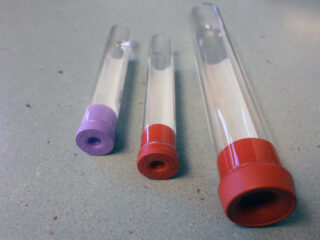 ALB (Albumin) – Low levels of this protein can be an indication of chronic liver or kidney disease or of an parasitic infection.
ALB (Albumin) – Low levels of this protein can be an indication of chronic liver or kidney disease or of an parasitic infection.
ALP (Alkaline Phosphatase) – These are found in liver, bone, kidney and intestines. High levels of this enzyme may indicate organ disease.
ALT (Alanine Aminotransferase) – Increased levels of this enzyme can be a sign of liver disease.
AMY (Amylase) – Elevated blood levels may indicate pancreatic and/or kidney disease.
TBIL (Total Bilirubin) – Bilirubin, a component of bile, is secreted by the liver into the intestinal tract. Blood bilirubin levels are helpful in evaluating liver disease and certain anemias.
BUN (Blood Urea Nitrogen) – BUN is produced by the liver and excreted by the kidneys. Testing for it helps detect liver and kidney abnormalities.
CA++, NA+ and K+ (electrolytes) – Identifying imbalances is important in the evaluation of various illnesses.
PHOS (Phosphorus) – Elevated levels may indicate kidney disease.
CRE (Creatinine) – Elevated levels of creatinine can indicate kidney disease or urinary obstruction.
GLU (Glucose) – High blood glucose may indicate diabetes or stress. Low levels may be signs of liver disease.
TP (Total Protein) – Total Protein helps with the diagnosis of many conditions including liver, kidney and gastrointestinal disease.
GLOB (Globulin) – These liver proteins are found in the blood and give a good indication about liver function.
T4 (Thyroid Test) – T4 fluctuation may indicate thyroid disease or secondary liver, kidney or metabolic abnormalities.
CHOL (Cholesterol) – Elevated levels of cholesterol can be an indication of a variety of disorders including hypothyroidism, liver and kidney disease.
CBC (Complete Blood Count) is a hematology test that provides measurements of red blood cells (carry oxygen to the tissues f the body ad remove carbon dioxide to be exhaled from the lungs), white blood cells (play an important role in fighting infection) and platelets (play a vital role in blood clotting). The CBC is an important tool that can indicate anemia, leukemia, stress, inflammation, infection and blood clotting capabilities.
